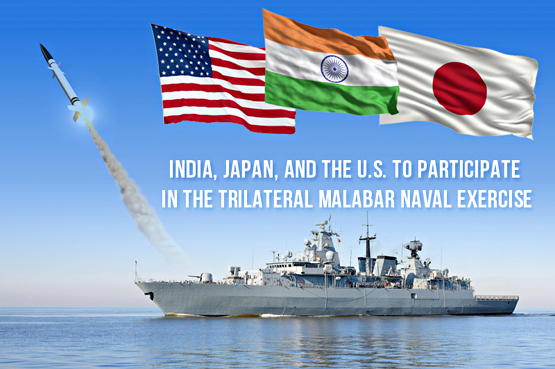
For years, the US, Japan and India have maintained Malabar military exercises on an annual basis. As the US and Japan are absolutely aligned countries and India is a Washington regional strategic partner, the common objective of the three participants is to face the Chinese advance and to strengthen a coalition against Beijing and its presence in the Indian Ocean. Now, with the increasing of tensions between China and the United States for naval supremacy and between China and India for territorial reasons, Malabar exercises take on a new dimension, being the moment of greatest risk of war in the region in recent years.
Since 2017, Australia has asked to join Malabar naval exercises. The US and Japan have already voted in favor of the Australian participation, but India has not allowed it – the US, Japan and India are the permanent members of the tests and the adherence of a new country depends on a unanimous vote. There was a logistical disagreement between India and Australia, which prevented them from reaching a consensus on the execution of the exercises. In June, both countries signed a mutual logistical support agreement, thus removing the obstacle to Australian participation. Now, as the impasse with China increases, India can change its vote and finally approve Australian participation. The result would be an even stronger coalition scenario against China, which would certainly respond accordingly.
Beijing will not allow its oceanic region to be the target of powerful military exercises by enemy powers without offering high-level war tests in return. China has recently reached an advanced stage of naval military power, practically equaling American power by crossing the International Date Line. In addition, China has significantly increased its military campaign in the South China Sea and has built a large fleet for the Arctic. It is this adversary that the Malabar coalition is facing when promoting a siege in the Indian Ocean. So, what will happen if China invests even more in naval power, modernizing its Navy and devoting itself to a military strategy focused on maritime defense?
On the other hand, Beijing’s reaction may be different and even more effective: investing in Sino-Pakistani military cooperation to affect India. If China and Pakistan start joint naval exercises in the Indian Ocean, a coalition dispute will form, in which both groups will begin a series of regular tests and demonstrations of strength, seeking to intimidate each other.
In all scenarios, a central point is inevitable: the increase of tensions and violence in the Indian Ocean. Perhaps this is, in fact, the American desire in the region, taking into account that the increase in the crisis will inevitably forge the strengthening of the anti-China coalition and its ties with Washington, in addition to encouraging regional reactions from the Chinese Navy and delaying Beijing’s global projections – like the Chinese presence in the Arctic, for example. Having been Japan and Australia subjected to the American naval umbrella for decades, their participation is predictable and not surprising that Tokyo and Canberra support aggressive operations against China in the Indian Ocean. However, the same cannot be said about India.
India should not be part of a Washington-led coalition against China. The rivalry between India and China is different from the dispute between the US and China, and the mere fact that Beijing looks like a “common enemy” does not justify a coalition. China and India have a historic dispute of a territorial nature – a regional conflict over a physical, continental space. This is different from the American quest for global hegemony – to which China poses a threat today. China and India have much more in common than opposites: both are emerging Asian nations, with enormous growth potential and which aim to increase their degree of participation in the international scenario, at the economic and geopolitical level. Washington, in this sense, is against both – because it seeks to preserve unipolarity and the American global dominance. Beijing and New Delhi can reach a common agreement sovereignly, with regional negotiations and bilateral diplomacy, as, in fact, they have been doing recently, resulting in the reduction of the border violence and the evacuation of troops.
By maintaining its participation in the exercises and encouraging the growth of the coalition, India will be making a big mistake – both in its relations with China and in its relations with Pakistan. Japan and Australia are nations willing to collaborate with American hegemony – India is not. The best path to be taken by the Indians is the abdication from the Malabar exercises, or, if it is not possible, at least, to prevent the Australian entry again, avoiding the strengthening of the anti-China alliance.
Lucas Leiroz is a research fellow in international law at the Federal University of Rio de Janeiro.




One thought on “India Should Not Participate in Washington-Led Anti-China Coalition”
Comments are closed.